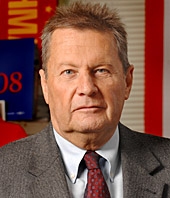AMES, Iowa -- There's no question that the Iowa caucuses' role as the first battleground state in the presidential election casts national exposure on the state like no other event. And because the 2008 campaign is wide open and has drawn a record number of candidates, the race and hype surrounding it began earlier than ever before.
But Steffen Schmidt doesn't think that's necessarily a good thing. The University Professor of political science at Iowa State University will explore that topic when he presents "More Fear and Loathing on the Campaign Trail: The Iowa Caucuses and American Presidential Candidate Selection" as this fall's Presidential University Lecture on Monday, Oct. 8, at 8 p.m. in the Memorial Union Sun Room. The event is free and open to the public. A reception and display of student research will precede the lecture at 7 p.m. in the South Ballroom.
"I'm going to talk about the Iowa caucuses as a part of the phenomenon and culture that we've developed of how we select the candidates for the two parties and how that involves, basically, a lot of smoke and mirrors," Schmidt said. "It involves mostly images and it's mostly a media phenomenon. The practical selection of delegates is pretty irrelevant in the Iowa caucuses."
Iowa caucuses now media-driven spectacle
Schmidt said he chose the "fear and loathing" title because of the media-driven spectacle the caucuses have become. He should know, since he has already been interviewed by reporters from such outlets as ABC, CNN, CNBC, PBS' "NewsHour with Jim Lehrer," C-SPAN, Fox News Radio, The New York Times, Chicago Tribune, and the Christian Science Monitor during the current campaign.
"It's sort of weird media tweakings and 'gotchas,' with candidates essentially trying to find out what is going to resonate with the media and then making moves that are going to get them ahead," he said. "And so in some ways, it's like a horse race. And yet in other ways, it's like a chess game where you try to move around the board in such a way that you end up somewhere strategically important by the time the thing (the caucuses) happens. The problem is that for politicians, the historical record is that you really don't know where you'll end up until caucus night because it's an unscientific process along the way. And until people divide up and vote in their caucuses on that night, anything can happen."
Schmidt plans to frame the Iowa caucuses in the context of a political theater or drama during his lecture. And while the candidates' stops across Iowa make for good theater -- in terms of video of candidates being questioned by locals in a coffee shop, or eating a corndog at the State Fair -- he says that it comes at a high cost in terms of campaign dollars spent on the first battleground state.
Iowa still special among early primary states
And yet Iowa's small-town charm and caucus format continue to make it unique among the early primary states.
"The atmosphere here is still fortunately so tranquil that candidates are essentially forced to deal with people on a day-to-day basis at these events," Schmidt said. "It's the smaller events where the candidates are forced not to be arrogant, but to listen to somebody who may have an off-the-wall question. But candidates have to be polite and listen and understand that a lot of voters out there have quirky questions. And as president, you're just as responsible for listening to them and understanding those questions as you are for huge foreign policy scenarios.
"So it (the intimacy of Iowa campaigning) is amusing in some ways, but in other ways, it's a very good test of the creativity, sense of humor, and integrity of the people who want to become president -- because they have to put up with all sorts of things that aren't necessarily scripted out for them," he said. "And that's what the presidency is all about."
Schmidt joined Iowa State's political science department in 1970. He specializes in public law and the government, policies of globalization, and, more recently, the policy and politics of managing coastal areas. He was named the 2007 Innovator of the Year by the Iowa Distance Learning Association. Schmidt is lead author of the best-selling American government textbook in the world, "American Government and Politics Today," which is now in its 17th edition. He also is co-editor of "Soldiers in Politics and Issues in Iowa Politics." Schmidt is known as "Dr. Politics" as a longtime commentator and co-host of WOI Radio's weekly political call-in show.
ISU President Gregory Geoffroy created the Presidential University Lecture Series in 2003 to highlight the expertise and excellence of Iowa State faculty.
